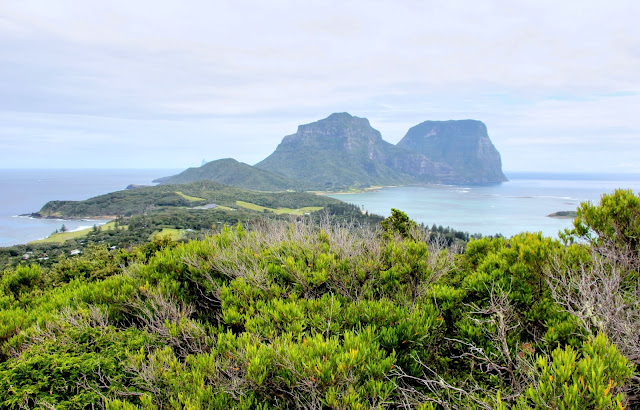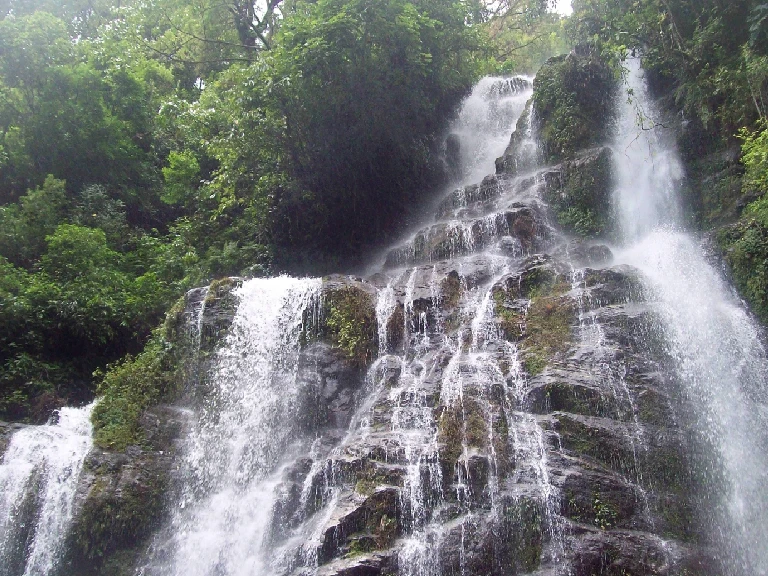The Picture of Paradise
I took a deep breath and looked all around me, my mind desperately trying to cling on to the 360 degree HD wallpaper images on display on a crisp sunny, cloudless day. There, on the right were the twin peaks of Mount Lidgbird and Mount Gower, towering over the islands like ubiquitous sentinels. On my left, faraway glistened the sparkling white Old Settlement’s Beach, while in front was the languorous lagoon beach, children of all ages splashing in its shallow waters, while I bobbed on a glass-bottomed boat on the turquoise lagoon itself, marvelling at the massive green turtles that moved beneath nonchalantly. I was at Lord Howe Island (pronounced as ‘How’) on a tropical island vacation - can ‘holiday’ sound any more envious than this in the Pacific?
Unknown to most travellers to Down Under, and perhaps even to a large proportion of locals, Lord Howe Island is NSW’s best kept secret. While Covid has crippled international travel altogether, and is intermittently maiming domestic travel as well, I was lucky to be allowed to enter this island, which lies legally under the jurisdiction of New South Wales, thereby doing away with the need for inter-state travel complications. I use the words ‘allowed’ as the 10km long stretch of volcanic islands - a fiercely protected UNESCO world heritage site - permits only 400 travellers a day. Coupled with its limited cottages for rental, it is not easy to holiday on this island and has taken me two years to finally be able to balance vacation with aviation and accommodation. But the results - perhaps the most fascinating travels I have had so far in my stay in this fabulous island-continent.
Talking of ‘continents’, it is interesting to mention here, that while Lord Howe Island is a part of Australia geopolitically, geographically it is on a different continent altogether - that of Zealandia! Zealandia, has in recent times, been claimed to be a micro-continent and later a drowned continent - a continental crust in its own right that broke off from Gondwanaland (the supercontinent that merged Australia, Africa, India among others) 80 million years back and completely submerged under the Pacific Ocean about 20 million years ago. Though more than half the size of Australia, and way larger than Greenland or the Indian sub-continent, Zealandia is nearly all under water, except for a few landmasses today, viz. New Zealand, New Caledonia (French overseas territory) and the two islands under Australia - Lord Howe and Norfolk. I guess there are very few places in the world where you can claim to travel within the same country, and yet move to a different continent - or micro-continent - altogether!
Named after British admiral, Lord Richard Howe, this island was historically discovered by the British way back in 1788 - the same year when Sydney was founded. In a sense, it was truly discovered by the British as unlike other neighbouring islands, Lord Howe Island was not inhabited by the Polynesians or Melanesians. It later became popular as a pit-stop for whaling and merchant ships to shore up on fresh water and feast on its flightless birds (a typical story of human decimation leading to extinction of island species, found nowhere else on earth). It was only in the 1840s, when fleeing the marauding Maoris in New Zealand, that a small group of three English families decided to establish a base in this island. It was thus by compulsion, rather than choice that paradise was conquered. The rest, as they say, is history. Seaplanes or flying boats were alighting on the island’s lagoon since the second world war bringing in plane-loads of tourists from Sydney Harbour, and opening up this tiny crescent of volcanic paradise to Australia, and the world (Lonely Planet included this tiny island in its list of Best of travel destinations 2020 further globalizing this tiny slice of local secret).
It’s not everyday you get to such a peaceful and sedentary place - there on the lagoon, I was trying to take in every pixel of sparkling beauty around me, forcing my mind to meditatively remember the moments. Other travellers on the boat had jumped into the crystal clear waters to snorkel in what is the world’s southernmost coral reef - I had to stay back to mind my little toddler who was fascinated to see her first corals and turtles and clownfish. I was not alone - with me was the boat’s captain, Peter, a proud local who held an interesting discussion about the unique flora and fauna of the island (along with a few of the titbits you would have read above).
When intellectual discussions gave way to informal chit-chat, we began to talk of our daily lives. I couldn’t contain my envy of living here in this paradise, taking tourists out to snorkel for a living and talking about migrating turtles and hammerhead sharks (the closest white collar job I could think of is one manager who stayed at a five star resort in Maldives for a month to set up the resort’s payments system).
But to my surprise, Peter gave a lopsided smile and asked me very frankly, ‘I can understand this envy, I get it very often from travellers, but do you know what part it is I look forward to twice a year?’
My pedantic brain scanned through archives of information on the Pacific, guessing for an amazing answer, ‘Migration of the whale sharks when the reef spawns?
He smiled. I had failed to read between the lines and understand his emotions.
‘No, my friend, it is when I leave this island and go to the mainland to see the rainforest or the red desert, or even the crowded cities, anything…’
‘But this is perfection,’ I responded almost instinctively. Who wants to leave paradise?
‘Yes, this is perfection,’ he spoke animatedly, his hands outstretched as if embracing all of the island, ‘Fantastic beaches, subtropical and temperate weather, a village where you know everyone, no crime, an easy job making good money....yes, this is perfection, but do you know what is more important than the 360 days of perfection?’
It still took some time to sink in, as Peter continued, ‘Stimulation. Change. 5 days of difference that can make me realise that this is perfection, not stagnation.’
Of course - as with everything else in this convoluted universe, nothing is absolute. Not even the picture of paradise. The man from the island needs to go to the city once in a while to rattle in the noise, as much as the city-slicker needs to visit the island and its coral cays- yin needed to complete the yang.
As the snorkellers got back on the boat, Peter went back to attending them, explaining their questions, differentiating sea cucumbers from sea urchins.
I reflected on our discussion and was captivated at yet another revelation, my mind going back to a Japanese story I had read in my Class I book - of two frogs climbing a hill and meeting at the summit - one from Osaka, the other from Kyoto. Both had heard that the other’s city was the most beautiful and hence had started their individual journeys. And yet, at the top, they realise how subjective the world is, and instead of continuing, they turn back - to each his own most beautiful city.
I smile - how silly that they teach you all in your elementary classes, and yet you take decades to understand the wisdom therein. No single place is paradise, rather, the entire world is paradise for those who can find their peace in a square inch of it. I stopped looking at the beauty around me, or forcing myself to remember all this surreal magic - perhaps true happiness occurs when you don’t have to remind yourself to be happy.
A sudden patch of clouds came from nowhere and capped the peaks. The sun went hiding, the skies were turning grey, yet everything looked beautiful…



Comments
Post a Comment